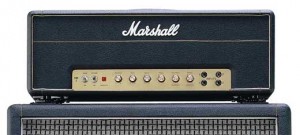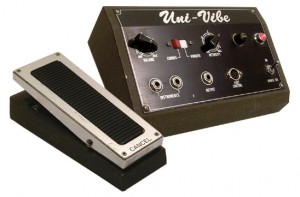Today’s article will teach you how to achieve vintage guitar tone of the 1960s. In this era, some of the best guitar players ever came into the spotlight such as Jimi Hendrix, Eric Clapton, George Harrison, Jimmy Page, and many more. Not only are they incredibly talented players, they also had guitar tone that many today still desire. So lets look at elements of why their tone is the way it is, so you will know how you can get closer to that ’60s style tone yourself.
Guitars
If you are using Schecters or Ibanez guitars (with the exception of copies), most likely you won’t get that vintage tone. The guitars used in the ’60s include Fender, Gibson, Rickenbacker, and Gretsch. Of course there are many others, but these were very notable at the time, especially the Stratocaster and Les Paul. Also in this era, the electronics were different then they are today. So if you want to make your modern day guitar more vintage-sounding, try installing low-output pickups.
 Amps
Amps
During the ’60s, digital didn’t exist. The amps used during this period were tube amps. In Britain, Marshall and Vox amps were very popular, specifically the Marshall Bluesbreaker and Plexi amps, and the Vox AC amps. You can find Jimi Hendrix and Eric Clapton using the Marshall Plexi amplifiers, while the Beatles were partial to the Vox amp (in the early ’60s). In the west, Fender Amps definitely were the most popular. These days, vintage amps can run you thousands of dollars. Check out old Traynor amps which replicated sounds of both Fender and Marshall at the time, but at a fraction of the cost. If you have a newer amp, you can change out the stock tubes with NOS tubes (new old stock) to get that vintage tone. While NOS tubes are expensive, you can with one pre-amp tube in V1 of your amp will have the most dramatic effect on tone. Mullard and RCA are among the best in the NOS tube world.
 Pedals
Pedals
Again, no digital pedals in this era. You want to look for analog pedals. Around the late ’60s, Fuzz pedals made their way onto the scene. If you want a 1967 style fuzz, which can be defined as warm, fat and creamy, look for a fuzz with Germanium transistors. If you want that more aggressive, in-your-face fuzz tone, go with the silicon transistors. Other pedals that became popular in the ’60s are Wahs, Octave, and of course the legendary Univibe.
So there you have it. Mix tube amps, with legendary guitars (with low output pickups), and pedals from this era, and you’ll get much closer to that ’60s guitar tone.
GuitarToneTalk.com is a participant in the Amazon Services LLC Associates Program, an affiliate advertising program designed to provide a means for sites to earn advertising fees by advertising and linking to Amazon.com